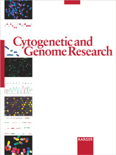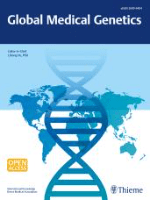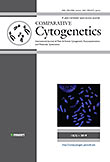
CYTOGENETIC AND GENOME RESEARCH
Scope & Guideline
Unveiling the complexities of genomes and their clinical impact.
Introduction
Aims and Scopes
- Cytogenetic Analysis:
The journal emphasizes the study of chromosome structure, number, and behavior, providing insights into chromosomal abnormalities and their association with various diseases. - Molecular Characterization:
A core focus is on the molecular characterization of genetic materials, including DNA sequencing and genomic mapping, to understand genetic diversity and evolutionary relationships. - Clinical Applications:
Research published often explores the clinical implications of cytogenetic findings, particularly in relation to genetic disorders, cancer, and reproductive health. - Comparative Genomics:
There is a consistent focus on comparative studies across species, which helps in understanding evolutionary processes and genetic variations. - Bioinformatics in Genomics:
Utilization of bioinformatics tools for analyzing genomic data is a key methodology, enabling researchers to interpret complex genetic information effectively.
Trending and Emerging
- Integrative Genomic Approaches:
There is an increasing trend toward integrative genomic studies that combine cytogenetics with molecular biology, emphasizing the importance of understanding genetic functions and interactions. - Radiation Genetics and Biodosimetry:
Research related to the effects of radiation on genetic material and the use of biodosimetry for assessing radiation exposure has gained significant traction, particularly in clinical and environmental contexts. - Epigenetics and Gene Regulation:
Emerging studies focusing on epigenetic modifications and their role in gene regulation and disease manifestation signify a growing interest in understanding complex gene expression mechanisms. - Application of Next-Generation Sequencing (NGS):
The use of NGS technologies for comprehensive genetic analysis is increasingly prevalent, allowing for detailed exploration of genetic variations and their associations with diseases. - Multi-Omics Approaches:
There is a rising interest in utilizing multi-omics strategies, combining genomics, transcriptomics, and proteomics to gain a holistic view of biological systems and their complexities.
Declining or Waning
- Traditional Karyotyping Techniques:
There has been a noticeable reduction in studies solely relying on classical karyotyping methods, as newer genomic techniques such as whole-genome sequencing gain preference for detailed analysis. - Single Organism Studies:
Research focused exclusively on single species or organisms appears to be declining in favor of more integrative approaches that consider comparative genomics across multiple species. - Basic Cytogenetic Techniques:
The publication frequency of papers discussing basic cytogenetic techniques, such as FISH without genomic context, has decreased, reflecting a shift towards more complex, multi-faceted investigations.
Similar Journals

Human Genome Variation
Unraveling the Secrets of Our DNAHuman Genome Variation, published by SpringerNature, is an esteemed open access journal dedicated to the field of genetic research and exploration. Since its inception in 2014, the journal has been at the forefront of advancing our understanding of human genome diversity and its implications in health and disease. With an E-ISSN of 2054-345X, it features a diverse array of studies that encompass biochemistry, genetics, and molecular biology, making it an invaluable resource for researchers and professionals alike. The journal holds a Q3 ranking in both biochemistry and genetics, and a Q4 ranking in molecular biology, highlighting its growing influence within these disciplines. As the landscape of genomics continues to evolve, Human Genome Variation serves as a platform for the dissemination of high-quality research, fostering collaboration and innovation within the scientific community. Researchers and academics are invited to contribute to this pivotal journal, which not only provides open access to its content since 2014 but also aims to bridge the gap between basic research and clinical applications in genetics.

GENES & GENETIC SYSTEMS
Empowering Discoveries in Genetics and MedicineGENES & GENETIC SYSTEMS, an esteemed journal published by the Genetics Society of Japan, serves as a vital platform for the dissemination of innovative research within the fields of genetics, molecular biology, and medicine. Established in 1996 and based in Mishima, Shizuoka, Japan, this journal has actively contributed to the academic community, fostering collaboration and knowledge sharing among researchers and professionals. The journal’s impact can be seen through its category quartiles, which reflect its position in Genetics, Molecular Biology, and Medicine, and while it currently ranks in Q4 in Genetics and Q3 in Medicine (miscellaneous), it is poised for growth as it continues to publish pivotal studies. With a commitment to open access, GENES & GENETIC SYSTEMS ensures that research findings are freely accessible to the global scientific community, promoting a more inclusive approach to knowledge distribution. This journal is essential for students, researchers, and professionals seeking to stay informed of advancements in genetic research and its implications for the broader field of medicine.

FUNCTIONAL & INTEGRATIVE GENOMICS
Elevating Genomic Science for a Healthier TomorrowFUNCTIONAL & INTEGRATIVE GENOMICS, published by Springer Heidelberg, is a leading journal in the fields of genetics and molecular biology. Established in 2000, it serves as a pivotal platform for advancing our understanding of genomic functionality and integration, making significant contributions to both basic and applied research in genetics. With a robust impact factor and a ranking in the Q3 quartile for Genetics and Q2 for Medicine (Miscellaneous), the journal aims to publish innovative research that explores the relationships between genomic data and biological functions, appealing to a diverse audience of researchers and professionals. Although it operates under a subscription model, the journal's extensive archives remain a valuable resource for academics seeking to stay abreast of the latest findings and methodologies in genomics. As the field evolves, FUNCTIONAL & INTEGRATIVE GENOMICS remains committed to fostering scholarly dialogue and the dissemination of groundbreaking studies that influence future research trajectories.

Global Medical Genetics
Transforming Healthcare Through Genetic InsightsGlobal Medical Genetics is a premier open-access journal dedicated to advancing the field of medical genetics. Published by GEORG THIEME VERLAG KG, this journal has been providing a dynamic platform for disseminating cutting-edge research and clinical findings since its inception in 2020. With the ISSN 2699-9404, it serves as an essential resource for researchers, healthcare professionals, and students who seek to explore the complex interplay between genetics and medicine. The journal aims to foster collaboration and innovation in the genetics community, addressing a diverse range of topics from genetic disorders to the application of genomics in personalized medicine. By providing open access to its content, Global Medical Genetics enhances knowledge sharing and accelerates advancements in healthcare, making it a vital asset for anyone invested in the future of genetics.

Comparative Cytogenetics
Advancing Knowledge in Cytogenetics and BeyondComparative Cytogenetics, an esteemed journal published by PENSOFT PUBLISHERS, is a pivotal resource in the fields of animal science, biotechnology, genetics, insect science, and plant science. Since its inception as an Open Access journal in 2009, it has significantly contributed to the democratization of scientific knowledge, allowing researchers and students across the globe to access cutting-edge developments in cytogenetics. With an impressive range of articles published from 2010 to 2024, this journal has achieved a commendable impact within the academic community, earning a Q3 ranking in Animal Science and Zoology, Biotechnology, and Insect Science, as well as a Q4 ranking in Genetics, indicating its growing influence. Its Scopus rankings reflect a solid standing, with notable percentiles showcasing its relevance across diverse biological sciences. Located in Sofia, Bulgaria, Comparative Cytogenetics serves not only to disseminate research but also to foster collaboration in understanding cytogenetic dynamics, making it an essential platform for professionals, researchers, and students alike.

NUCLEUS-INDIA
Innovating insights in Cell Biology and Genetics.NUCLEUS-INDIA is a prominent academic journal that delves into the intricate realms of Cell Biology, Genetics, Molecular Biology, and Molecular Medicine. Published by SPRINGER INDIA, this journal has been a reliable source of innovative research since its inception in 2011. With an ISSN of 0029-568X and an E-ISSN of 0976-7975, NUCLEUS-INDIA stands out in the scientific community, functioning as a critical platform for the dissemination of groundbreaking findings and advancements within its fields of study. Despite being categorized in the lower quartiles as of 2023, it remains an important contributor to the literature, providing insights that influence both academic and practical perspectives in genetics and molecular sciences. Researchers, professionals, and students alike can benefit from its diverse array of articles addressing contemporary challenges and innovations. The journal is located at 7th Floor, Vijaya Building, 17, Barakhamba Road, New Delhi 110 001, India, and aims to enhance the scholarly discourse in biology by publishing works that push the boundaries of current understanding.

GENOME BIOLOGY
Advancing the frontiers of genomics and molecular biology.GENOME BIOLOGY is a premier, peer-reviewed journal published by BMC, focusing on the rapidly evolving fields of genomics, molecular biology, and bioinformatics. Accessible as an Open Access journal since 2000, it aims to disseminate high-quality, cutting-edge research that contributes to our understanding of genome biology's intricate mechanisms. The journal boasts an impressive impact, ranking 8th in Agricultural and Biological Sciences and 9th in Biochemistry, Genetics and Molecular Biology, highlighting its significance among scholars, professionals, and students alike. With a commitment to facilitating the exchange of invaluable scientific knowledge, GENOME BIOLOGY provides an important platform for discussions on evolutionary biology, genetic systems, and cell biology, contributing to the advancement of these dynamic disciplines.

Molecular Cytogenetics
Bridging the Gap Between Genetics and Cellular Mechanisms.Molecular Cytogenetics is a prestigious open-access journal published by BMC, dedicated to advancing the fields of biochemistry, genetics, and molecular biology. Since its inception in 2008, this journal has facilitated prominent research and developments in the cytogenetics domain, featuring innovative studies and reviews that explore the intricate relationship between cellular structures, genetic makeup, and various biological processes. With a robust impact factor and a commendable positioning within Q3 and Q4 categories across multiple relevant disciplines, it provides a vital platform for researchers to disseminate their findings to a global audience. The journal's open-access model ensures that cutting-edge research is readily available to students, professionals, and scholars, promoting free knowledge exchange. Situated in the vibrant landscape of the United Kingdom, Molecular Cytogenetics continues to contribute significantly to scientific progress, solidifying its role as an essential resource for those engaged in the exploration of genetic and cytogenetic inquiry.

Genetics Research
Driving Progress in Genetic and Medical SciencesGenetics Research, published by HINDAWI LTD, is a distinguished open access journal that has been at the forefront of genetic studies since its inception in 1960. With the transition to open access in 2019, this journal has expanded its accessibility, fostering knowledge dissemination across the global scientific community. Operating out of the United Kingdom, it provides a platform for innovative research in the fields of genetics and molecular biology, encompassing a broad range of topics that are highly relevant to medical sciences. As of 2023, it holds a Q4 classification in Genetics and a Q3 classification in miscellaneous Medicine, reflecting its ongoing commitment to scholarly excellence amidst shifting academic landscapes. While the journal's H-index remains unlisted, its indexed ranking within Scopus, with a rank of #325/328 in the Genetics category highlights the challenges ligated to its niche audience. Nevertheless, it serves as a crucial resource for researchers, professionals, and students eager to contribute to and stay informed on the latest genetic research trends and breakthroughs.

npj Genomic Medicine
Unlocking the Potential of Genomic Researchnpj Genomic Medicine is a leading open-access journal published by NATURE PORTFOLIO, specializing in the rapidly evolving areas of genomic medicine, including genetics, molecular biology, and clinical applications. Launched in 2016, the journal has quickly established itself within the academic community, boasting a prestigious Q1 ranking in multiple categories, including Genetics and Molecular Biology, with remarkable positions in both Scopus ranks and percentiles. With an emphasis on innovative genomic research that bridges the gap between laboratory findings and clinical implementation, npj Genomic Medicine aims to provide a platform for researchers, professionals, and students to share significant advancements and insights. Being an open-access journal enhances accessibility to cutting-edge research, ensuring that vital discoveries in genomics can benefit a global audience and facilitate interdisciplinary collaboration. The journal continues to contribute to the forefront of genomic research, impacting both academic scholarship and practical healthcare solutions.